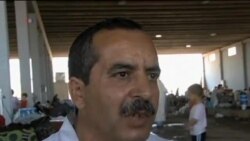Aid organizations are facing increasing challenges as the humanitarian crisis in Syria worsens and millions of Syrians face hunger, disease and winter weather.
Many Syrians continue to flee their country and the fierce fighting of its civil war.
Many hold their children. Others bring only the belongings they can carry on their backs.
Refugees like Muteea Talaa are desperate.
"God helped me to reach this point. We were crying because of hunger, my grandsons were crying because there was no food, we suffered a lot and my disabled son has suffered a lot," said Talaa.
Now, rebels say the government is dropping barrel bombs on heavily populated cities like Aleppo.
The indiscriminate bombing is forcing more and more civilians to flee their homes, many ending up in makeshift camps in need of assistance.
Adnan Abdulrahman is one of them.
"I hope that we receive help to get toilet facilities, bathrooms, water. We don't have electricity either," said Abdulrahman.
One third of Syria’s pre-war population of 23 million has been displaced, with 2.3 million now refugees in other countries.
Nancy Lindborg is in charge of humanitarian assistance at the U.S. Agency for International Development (USAID).
“The Syria crisis is probably one of the most complicated and most difficult and certainly the largest that we are facing globally," said Lindborg.
The United Nations estimates that more than nine million people in Syria need humanitarian aid.
The U.S. is the largest aid donor. But because of intense fighting in and around some key cities, supplies cannot be delivered.
Again, Nancy Lindborg:
“There are about 250,000 people who are in cities that are under siege by the Syrian regime, and we cannot reach them with food, with winter supplies or with medical help," she said.
And now the weather has become an enemy. The first winter storm in the region pushed temperatures below zero.
Thousands of Syrians will spend the winter in tents, often with only a plastic sheet covering the ground.
Um Abdullha Najia and her family have been living in a small tent for months.
"As you can see, seven people are living in this small tent. It is our kitchen, our bathroom, our showers, our living room, everything is inside this tent. But the situation is worse outside," said Najia.
And now, health officials are concerned about an outbreak of polio in Syria. They say a vaccination campaign is being hampered by the war.
Officials say the paralyzing disease underscores the type of humanitarian threats that emerge in conflict zones and there is fear it could become an epidemic.
“We are seeing development gains inside Syria being rolled back by 35 years, including the reemergence of these kinds of diseases," said Lindborg.
Lindborg says the humanitarian crisis in Syria and neighboring countries is getting worse with the onset of winter.
Many Syrians continue to flee their country and the fierce fighting of its civil war.
Many hold their children. Others bring only the belongings they can carry on their backs.
Refugees like Muteea Talaa are desperate.
"God helped me to reach this point. We were crying because of hunger, my grandsons were crying because there was no food, we suffered a lot and my disabled son has suffered a lot," said Talaa.
Now, rebels say the government is dropping barrel bombs on heavily populated cities like Aleppo.
The indiscriminate bombing is forcing more and more civilians to flee their homes, many ending up in makeshift camps in need of assistance.
Adnan Abdulrahman is one of them.
"I hope that we receive help to get toilet facilities, bathrooms, water. We don't have electricity either," said Abdulrahman.
One third of Syria’s pre-war population of 23 million has been displaced, with 2.3 million now refugees in other countries.
Nancy Lindborg is in charge of humanitarian assistance at the U.S. Agency for International Development (USAID).
“The Syria crisis is probably one of the most complicated and most difficult and certainly the largest that we are facing globally," said Lindborg.
The United Nations estimates that more than nine million people in Syria need humanitarian aid.
The U.S. is the largest aid donor. But because of intense fighting in and around some key cities, supplies cannot be delivered.
Again, Nancy Lindborg:
“There are about 250,000 people who are in cities that are under siege by the Syrian regime, and we cannot reach them with food, with winter supplies or with medical help," she said.
And now the weather has become an enemy. The first winter storm in the region pushed temperatures below zero.
Thousands of Syrians will spend the winter in tents, often with only a plastic sheet covering the ground.
Um Abdullha Najia and her family have been living in a small tent for months.
"As you can see, seven people are living in this small tent. It is our kitchen, our bathroom, our showers, our living room, everything is inside this tent. But the situation is worse outside," said Najia.
And now, health officials are concerned about an outbreak of polio in Syria. They say a vaccination campaign is being hampered by the war.
Officials say the paralyzing disease underscores the type of humanitarian threats that emerge in conflict zones and there is fear it could become an epidemic.
“We are seeing development gains inside Syria being rolled back by 35 years, including the reemergence of these kinds of diseases," said Lindborg.
Lindborg says the humanitarian crisis in Syria and neighboring countries is getting worse with the onset of winter.





